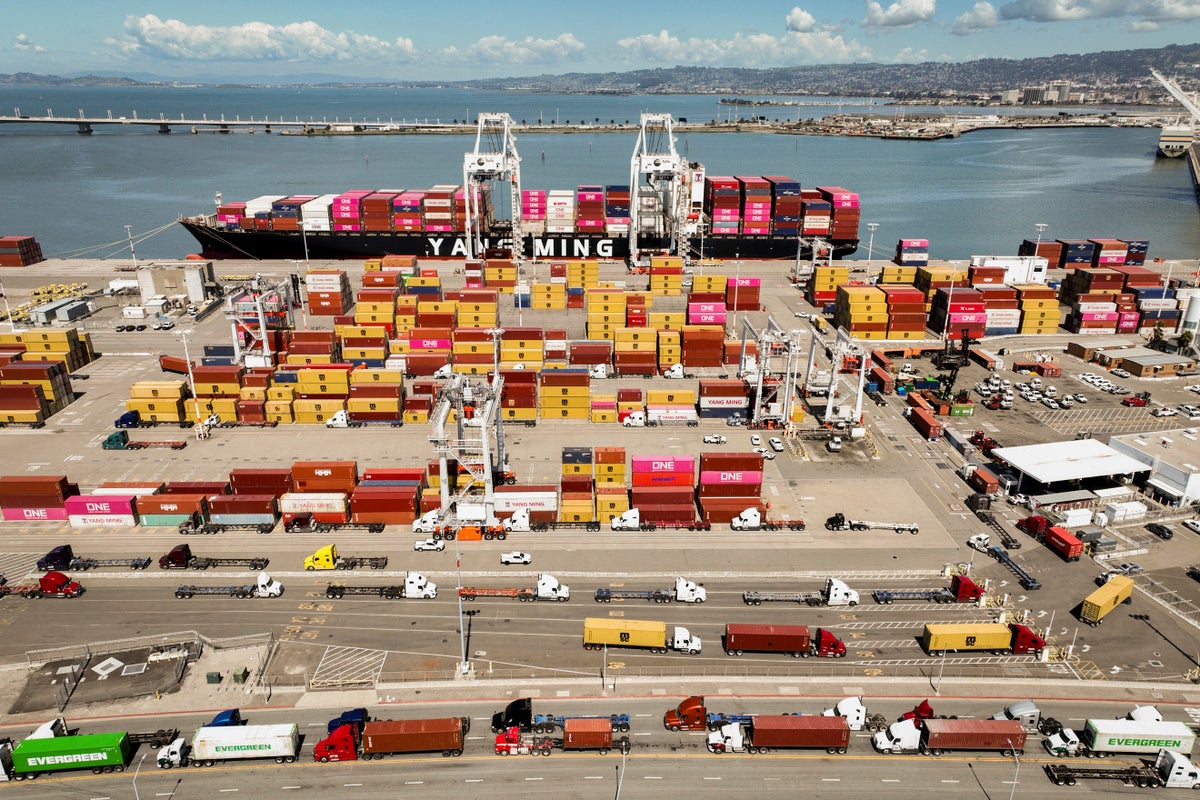Data: Financial Modeling Prep; Chart: Axios VisualsEconomics 101 dictates that higher tariffs strengthen the value of a country's currency, but Trump's tariff announcement sent the value of the U.S. dollar plunging.
Why it matters: It's a sign that investors are worried about a recession, particularly in the U.S. — on top of concern that U.

S. policies are making America a longer-term risky bet.By the numbers: An index that tracks the value of the dollar against six major currencies was at 102.
1 on Thursday, from around 104 before reciprocal tariffs were unveiled. (A lower number means a weaker dollar). Catch up quick: The dollar strengthened after the election.
Investors were optimistic about deregulation and tax cuts and anticipated economic growth. Since inauguration day it's fallen back.The intrigue: Up until right before Trump's announcement, investors had expected the dollar to rise on tariff news, WSJ points out.
They had reason. The idea that tariffs make the dollar more valuable "has been part of economic theory for 100 years," Joseph Gagnon, a senior fellow who specializes in exchange rates and monetary policy at the Peterson Institute, tells Axios.A 2019 study of 151 countries from the International Monetary Fund found this was still the case — at least in the short term.
How it works: The rules of supply and demand apply to currency, too, as Nobel-prize winning economist Paul Krugman explained to Axios reporters on a recent episode of Slate Money.Tariffs are supposed to reduce demand for imports. In the U.
S. that would mean there's less need for businesses to exchange dollars for other currencies to buy foreign goods. That would translate into fewer dollars to trade on the currency market.
Less supply means higher prices, but only if demand stays relatively constant.The big picture: The magnitude of these tariffs is changing the equation. They've spooked markets about recession risk to such an extent that for now, pessimism is causing the dollar to weaken.
When the economy softens, so can the value of the dollar, because demand for money overall falls.The dollar has weakened more than other currencies, as the index shows, because investors believe the U.S.
economy is more at risk from the tariffs than other major countries. "When US growth is negative and rest of world growth is positive, the Dollar weakens on average," per a 2024 note from Goldman Sachs. What they're saying: "The blowback of US tariffs onto the US domestic economy leaves the dollar naked," writes ING's chief international economist James Knightley in a note.
There is concern that this drop is bigger than recession fears. "One way of interpreting this is investors are suddenly becoming afraid of the policies that are being promoted in the U.S.
, and therefore they don't want their money here," say Gagnon of the Peterson Institute.Alan Cole, a senior economist with the Tax Foundation's Center for Federal Tax Policy, tells Axios "If people think the U.S.
isn't a good place to invest in, they might say, 'I don't trust this whole tariff regime,' or 'I don't trust the U.S. economy,'"The other side: Markets go up and down, of course.
Ultimately, it's possible tariffs could strengthen the dollar, says Gagnon.On Thursday, as stocks were plummeting, Trump was optimistic."The markets are going to boom, the stock is going to boom, the country is going to boom.
" -Jason Lalljee contributed reporting.
Why the dollar is doing what it's not supposed to do

Data: Financial Modeling Prep; Chart: Axios VisualsEconomics 101 dictates that higher tariffs strengthen the value of a country's currency, but Trump's tariff announcement sent the value of the U.S. dollar plunging.Why it matters: It's a sign that investors are worried about a recession, particularly in the U.S. — on top of concern that U.S. policies are making America a longer-term risky bet.By the numbers: An index that tracks the value of the dollar against six major currencies was at 102.1 on Thursday, from around 104 before reciprocal tariffs were unveiled. (A lower number means a weaker dollar). Catch up quick: The dollar strengthened after the election. Investors were optimistic about deregulation and tax cuts and anticipated economic growth. Since inauguration day it's fallen back.The intrigue: Up until right before Trump's announcement, investors had expected the dollar to rise on tariff news, WSJ points out.They had reason. The idea that tariffs make the dollar more valuable "has been part of economic theory for 100 years," Joseph Gagnon, a senior fellow who specializes in exchange rates and monetary policy at the Peterson Institute, tells Axios.A 2019 study of 151 countries from the International Monetary Fund found this was still the case — at least in the short term.How it works: The rules of supply and demand apply to currency, too, as Nobel-prize winning economist Paul Krugman explained to Axios reporters on a recent episode of Slate Money.Tariffs are supposed to reduce demand for imports. In the U.S. that would mean there's less need for businesses to exchange dollars for other currencies to buy foreign goods. That would translate into fewer dollars to trade on the currency market. Less supply means higher prices, but only if demand stays relatively constant.The big picture: The magnitude of these tariffs is changing the equation. They've spooked markets about recession risk to such an extent that for now, pessimism is causing the dollar to weaken.When the economy softens, so can the value of the dollar, because demand for money overall falls.The dollar has weakened more than other currencies, as the index shows, because investors believe the U.S. economy is more at risk from the tariffs than other major countries. "When US growth is negative and rest of world growth is positive, the Dollar weakens on average," per a 2024 note from Goldman Sachs. What they're saying: "The blowback of US tariffs onto the US domestic economy leaves the dollar naked," writes ING's chief international economist James Knightley in a note.There is concern that this drop is bigger than recession fears. "One way of interpreting this is investors are suddenly becoming afraid of the policies that are being promoted in the U.S., and therefore they don't want their money here," say Gagnon of the Peterson Institute.Alan Cole, a senior economist with the Tax Foundation's Center for Federal Tax Policy, tells Axios "If people think the U.S. isn't a good place to invest in, they might say, 'I don't trust this whole tariff regime,' or 'I don't trust the U.S. economy,'"The other side: Markets go up and down, of course. Ultimately, it's possible tariffs could strengthen the dollar, says Gagnon.On Thursday, as stocks were plummeting, Trump was optimistic."The markets are going to boom, the stock is going to boom, the country is going to boom." -Jason Lalljee contributed reporting















